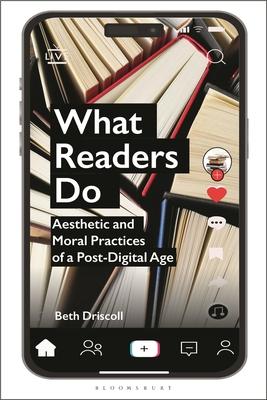Shining a spotlight on everyday readers of the 21st century, Beth Driscoll explores how contemporary readers of Anglophone fiction interact with the book industry, digital environments, and each other.
We live in an era when book clubs, bibliomemoirs, Bookstagram and BookTok are as valuable to some readers as solitary reading moments. The product of nearly two decades of qualitative research into readers and reading culture, What Readers Do examines reading through three dimensions - aesthetic conduct, moral conduct, and self-care - to show how readers intertwine private and social behaviors, and both reinforce and oppose the structures of capitalism. Analyzing reading as a post-digital practice that is a synthesis of both print and digital modes and on- and offline behaviors, Driscoll presents a methodology for studying readers that connects book history, literary studies, sociology, and actor-network theory. Arguing for the vitality, agency, and creativity of readers, this book sheds light on how we read now - and on how much more readers do than just read.

What Readers Do: Aesthetic and Moral Practices of a Post-Digital Age
Shining a spotlight on everyday readers of the 21st century, Beth Driscoll explores how contemporary readers of Anglophone fiction interact with the book industry, digital environments, and each other.
We live in an era when book clubs, bibliomemoirs, Bookstagram and BookTok are as valuable to some readers as solitary reading moments. The product of nearly two decades of qualitative research into readers and reading culture, What Readers Do examines reading through three dimensions - aesthetic conduct, moral conduct, and self-care - to show how readers intertwine private and social behaviors, and both reinforce and oppose the structures of capitalism. Analyzing reading as a post-digital practice that is a synthesis of both print and digital modes and on- and offline behaviors, Driscoll presents a methodology for studying readers that connects book history, literary studies, sociology, and actor-network theory. Arguing for the vitality, agency, and creativity of readers, this book sheds light on how we read now - and on how much more readers do than just read.